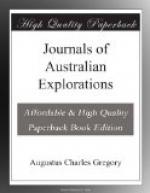Left our uncomfortable bivouac at 7.30 a.m.; steered south-east. Finding the horses scarcely able to travel from want of water, I took the strongest and rode over to the spot where we had obtained a little on the 30th September, to dig wells and have a supply ready, if it could be obtained in sufficient quantity; at 11.0 arrived, and found the wells we had dug nearly dry; by opening several trenches down to the rocks which lay about one and a half feet below the surface, the water oozed in, and when the party came up, at 12.0, there was about a gallon for each horse; taking off the packs, we commenced watering: four horses had received their small allowance, when it came to my horse Bob’s turn; after drinking his share he marched off at a smart pace, which somewhat surprised us, as he started in the direction of what we had supposed to be nothing but a tea-tree scrub; on following him, we found the horse drinking at a small shallow pool of water in a hollow in the clay. This was a very fortunate discovery, as the trenches filled with water so slowly that a full supply could not have been obtained that night, and the horses had been sixty-five hours without water.
Sand plains and scrub. Return to the Murchison river.
3rd October.
This morning Mr. Burges and myself started at 7.30 a.m. in a north-easterly course, to ascertain the practicability of proceeding in that direction, taking two of the strongest horses. After riding four hours over an open, scrubby sand-plain, with circular valleys, we again fell in with thickets of wattles so dense that, although burnt by the native fires about four years previous, they would have been impassable for the pack-horses; but, favoured by this circumstance, we penetrated the thicket in a north-north-west direction for about twelve miles. From one small sandy ridge we had an extensive view, but of a most discouraging nature; the whole country was one vast plain, covered with dense thickets and scrub as far as the eye could reach, except to the west-north-west, where rose a high and barren ridge, which would not have been visible but for excessive refraction, as it must have been more than twenty-five miles distant. The plain was still dotted over with the remarkable circular hollows or valleys which, by their extreme dryness, indicated a great depth of sandy soil, incapable of retaining water on the surface even for a short time, or any probability of our obtaining it by digging. We turned in disappointment towards the encampment, scarcely extricating ourselves from the thickets before it became dark. Having gained the sand-plain, we continued our return for several hours, steering by the stars, hoping by a night march to avoid the scorching effects of the sun, which at this season renders travelling over an extensive sandy plain very fatiguing. Having been more than eleven hours in the saddle, we halted for the night.




